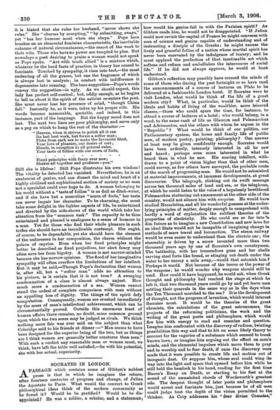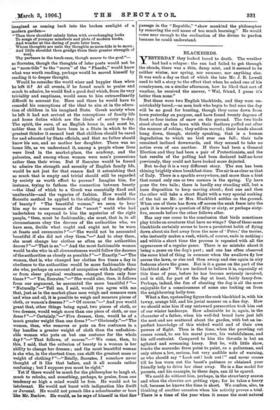SOCRATES IN LONDON. A PASSAGE which contains some of Gibbon's noblest
prose is that in which he imagines the return, after fourteen centuries of progress and change, of Julian the Apostate to Paris. What would the convert to Greek philosophical ideas think of the modern community as he found it? Would he be gratified Would he be dis- appointed? He was a soldier, a scholar, and a statesman;
how would his genius fall in with the Parisian spirit ? As Gibbon reads him, he would not be disappointed. "If Julian could now revisit the capital of France he might converse with men of science and genius capable of understanding and of instructing a disciple of the Greeks ; he might excuse the lively and graceful follies of a nation whose martial spirit has never been enervated by the indulgence of luxury; and he must applaud the perfection of that inestimable art which softens and refines and embellishes the intercourse of social life." If he did not always approve, he would at least understand.
Gibbon's reflection may possibly have crossed the minds of some of those who during the past fortnight or so have read the announcements of a course of lectures on Plato to be delivered at a fashionable London hotel. If Socrates were to visit London, what would he think of the life of a great modern city What, in particular, would he think of the ideals and habits of living of the wealthier, more leisured classes,—those who could spare the time, for instance, to attend a course of lectures at a hotel ; who would belong, in a word, to the same rank of life as Glaucon and Polemarchus and Adeimantus, and the others with whom he argues in the " Republic " ? What would he think of our politics, our Parliamentary system, the home and family life of public men, of modern poetry, painting, philosophy ? One answer at least may be given confidently enough. Socrates would have been ardently, intensely interested in all he saw and heard ; perhaps even more interested in what he heard than in what he saw. His soaring intellect, with- drawn to a point of vision higher than that of other men, could survey, as few others have surveyed, the probable route of the march of progressing man. He would not be astonished at material improvements, at immense developments, at great discoveries. The telegraph, clicking out its swift message across ten thousand miles of land and sea, or the telephone, at which he could listen to the voice of a hopelessly bewildered Polemarchus stuttering out amazement at the other side of the country, would not silence him with surprise. He would have studied Heracleitus, and all his wonderful guesses at the under- lying principles of matter, deeply enough to comprehend with hardly a word of explanation the subtlest theories of the properties of electricity. He who could see so far into 'a dim future as to imagine a new Constitution and new laws for an ideal State would not be incapable of imagining change in methods of mere travel and locomotion. The steam railway would be even easier to understand than the electric car ; the steamship is driven by a screw invented more than two thousand years ago by one of Socrates's own countrymen. The battleship, with her tremendous guns and her shells carving steel forts like bread, or stinging out death under the water to her enemy a mile away,—would that astonish him P Perhaps it would. Not because of the terror or the power of the weapons ; he would wonder why weapons should still be used. How could it have happened, he would ask, when Greek thought and philosophy had reached the stage at which he left it, that two thousand years could go by and yet leave men settling their quarrels in the same way as in the days when the Ten Thousand marched to the sea? It is the development of thought, not the progress of invention, which would interest Socrates most. It would be the theories of the great chemists, the calculations of the great astronomers, the projects of the reforming politicians, the work and the writing of the great poets and philosophers, which would fire him with energy to read and examine and question. Imagine him confronted with the discovery of radium, twisting possibilities this way and that to bit on some likely theory to account for the vagaries of a substance which seemed to break known laws; or imagine him arguing out the effect on men's minds, and the elemental impulses which move them to pray and to worship and to fear death, if once the discovery were made that it were possible to create life and motion out of inorganic dust. Or suppose him, whose soul could wing its way into the light and space that opened before him while he still held the hemlock in his hand, reading for the first time Bacon's Essay on Death, or starting to his feet at the sound of the unmatched chords of Wordsworth's greatest ode. The deepest thought of later poets and philosophers would arrest and fascinate him, just because he of all men could judge best the depth of the vision permitted to the thinker. As Cog addresses his "dear divine °mates,"
imagined as coming back into the broken sunlight of a modern garden- " Then thou shouldst calmly listen with everchanging looks To songs of younger minstrels and plots of modern books, And wonder at the daring of poets later born, Whose thoughts are unto thy thoughts as noon-tide is to morn; And little shouldst thou grudge them their greater strength of soul,
Thy partners in the torch-race, though nearer to the goal"—
so Socrates, though the thoughts of later poets would not be as "noon-tide" to the "morn" of the " Phaedo," would know what was worth reading, perhaps would be moved himself by reading it to deeper thought. Would he consider the world wiser and happier than when he left it P At all events, if he found much to praise and much to admire, he would find a good deal which, from its very triviality and emptiness, would seem to him extraordinarily difficult to account for. Here and there he would have to remodel his conceptions of the ideal to aim at in the educa- tion of children in his imagined State. Greek society when he left it had not arrived at the conceptions of family life and home duties which are the ideals of society to-day.
The spirit, the aura, of an English home is, and must be, nobler than it could have been in a State in which to the ' greatest thinker it seemed best that children should be cared for and educated by State officials, and that no father should know his son, and no mother her daughter. There was no home life, as we understand it, among a people whose lives were lived in the market-place, the academy, and the palaestra, and among whom women were men's possessions rather than their wives. But if Socrates would be forced to admire the strength and serenity of English family life, would he not just for that reason find it astonishing that so much that is empty and trivial should still be regarded by society as worth effort to pursue P Imagine him, for instance, trying to fathom the connection between beauty —the ideal of which to a Greek was essentially fixed and 'unalterable—and the vagaries of fashion. How would the Socratic method be applied to the eliciting of the definition of beauty ? "The beautiful woman," we seem to hear him say to some woman of the " smart " world who had 'undertaken to expound to him the mysteries of the right people, "then, must be fashionable; she must, that is. in all circumstances obey the decrees of the authorities who, we have seen, decide what ought and ought not to be worn at feasts and ceremonies ? "—" She would not be accounted 'beautiful if she did not obey them."—" And to obey them, she must change her clothes as often as the authorities decree ?"—" That is so."—" And the most fashionable woman would be she who in all circumstances would follow the decrees of the authorities as closely as possible P "—" Exactly."—" The woman, that is, who changed her clothes five times a day in obedience to the authorities would be more fashionable than she who, perhaps on account of occupation with family affairs or from sheer physical weakness, changed them only four times ? "—" Yes, Socrates."—" She would also, then, it follows from our argument, be accounted the more beautiful ? "- "Naturally."" Tell me, I said, would you agree with me that, just as in the market-place men weigh and measure corn and wine and oil, it is possible to weigh and measure pieces of 'cloth, or women's dresses ? "—" Of course."—" And you would grant that, other things being equal, two pieces of cloth, or two dresses, would weigh more than one piece of cloth, or one
dress P "—" Certainly."—" Five dresses, then, would be of a 'much greater weight than one dress ?"—" Obviously?'—" The woman, then, who removes or puts on five costumes in a 'day handles a greater weight of cloth than the unfashion- able woman who puts on but one costume for the whole day? "—" That follows, of course."—" We come, then, to this, I said, that the criterion of beauty in a woman is her ability to change her dresses ; and the most beautiful woman is she who, in the shortest time, can shift the greatest mass or weight of clothing ?"—"Rdally, Socrates, I somehow never thought of it like that before, and it all sounds rather confusing ; but I suppose you must be right."
Yet if there would be much for the philosopher to laugh at,
much to rebuke, and something, perhaps, to praise, from one tendency so high a mind ,would be free. He would not he intolerant. He would not burst with indignation like Swift or Juvenal. He would not preach like a schoolmaster or bore -like Mr. Barlow. He would, as he says of himself in that fine
passage in the "Republic," "show mankind the philosopher by removing the evil name of too much learning." He would come near enough to the realisation of the divine to pardon because he could understand.















































 Previous page
Previous page